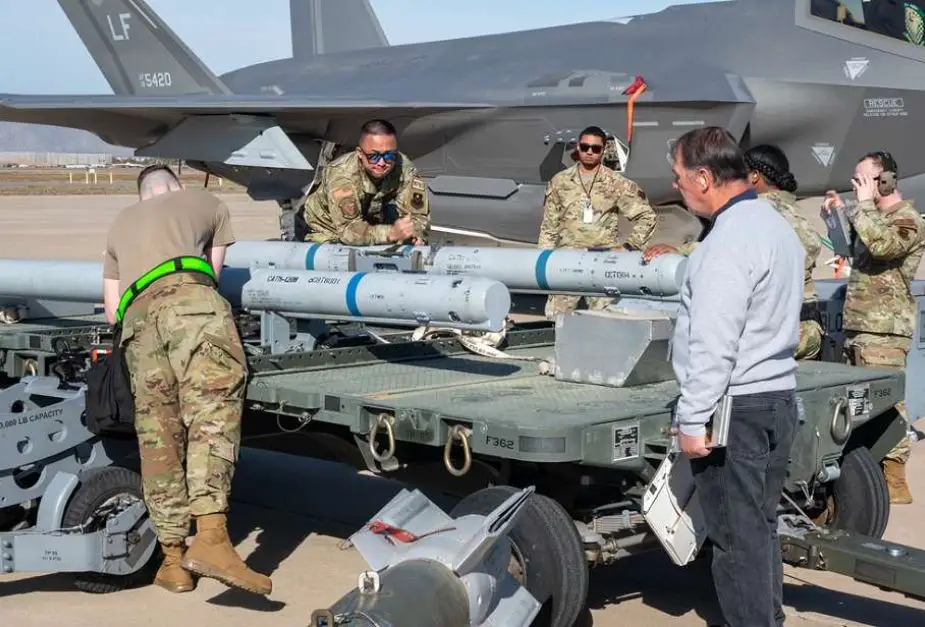Breaking News
Raytheon Awarded Contract for AMRAAM Missile Development Lab Management and Maintenance.
On July 15, 2024, the U.S. Department of Defense announced the awarding of a $14,455,937 indefinite-delivery/indefinite-quantity contract to Raytheon Company, based in Tucson, Arizona. This significant contract is designated for the management and maintenance of the Advanced Medium Range Air-to-Air Missile (AMRAAM) development laboratory.
Follow Army Recognition on Google News at this link

U.S. Air Force Airmen assigned to the 308th Aircraft Maintenance Unit prepare an AIM-120 AMRAAM missile during the annual weapons load competition at Luke Air Force Base, Arizona. (Picture source: U.S. DoD)
The contract focuses on the Air Intercept Missile-120 (AIM-120) AMRAAM, a key component in modern aerial combat operations. The AIM-120 is renowned for its beyond-visual-range capabilities, designed to engage targets at long distances and maintain superiority in air-to-air engagements.
Under this contract, Raytheon's development branch will be responsible for overseeing the comprehensive design, development, integration, and testing of both hardware and software improvements to the AMRAAM system. This initiative is part of the ongoing efforts to ensure that the AMRAAM remains at the forefront of air-to-air missile technology, adapting to evolving threats and maintaining a competitive edge.
Raytheon will innovate new designs for the AMRAAM, focusing on enhancing its performance, reliability, and adaptability to various combat scenarios. This includes upgrading the missile's propulsion system, guidance system, and overall aerodynamics. Ensuring seamless integration of the updated AMRAAM with existing and future aircraft platforms is crucial. Raytheon will work closely with the U.S. Air Force and other stakeholders to integrate these advancements into operational frameworks. Rigorous testing protocols will be implemented to validate the enhancements made to the AMRAAM. This includes a series of live-fire exercises, simulated engagements, and other testing methodologies to ensure the missile performs as expected under diverse conditions. Ongoing maintenance of the development laboratory will be a critical component, ensuring that all equipment and facilities are in optimal condition to support the continuous development and testing of the AMRAAM.
The AIM-120 AMRAAM has been a cornerstone of the U.S. military's air-to-air combat capabilities for decades. Its advanced radar guidance system and its high-speed and agility make it a formidable weapon in aerial engagements. By investing in the continued development and enhancement of the AMRAAM, the U.S. Department of Defense aims to maintain its technological edge and ensure the readiness of its air forces in the face of emerging global threats.
Raytheon, a leading defense contractor with a long history of innovation and excellence, is well-positioned to execute this contract. The company's expertise in missile technology and its commitment to advancing defense capabilities align with the objectives of this program. Raytheon's facilities in Tucson, Arizona, will serve as the hub for these development activities, leveraging state-of-the-art technology and a skilled workforce to achieve the contract's goals.
This contract award underscores the importance of continuous improvement and modernization in defense technology. As adversaries develop more sophisticated air combat tactics and technologies, the U.S. must remain at the forefront of innovation to safeguard its national security interests.
The $14.5 million contract awarded to Raytheon for managing and maintaining the AMRAAM development laboratory is a strategic investment in the future of U.S. air-to-air combat capabilities. Through rigorous design, development, integration, and testing processes, this program aims to enhance the performance and reliability of the AIM-120 AMRAAM, ensuring it remains a vital component of the U.S. military's arsenal.
As Raytheon embarks on this critical endeavor, the partnership between the company and the U.S. Department of Defense exemplifies a shared commitment to maintaining air superiority and protecting national security in an ever-evolving global landscape.


























